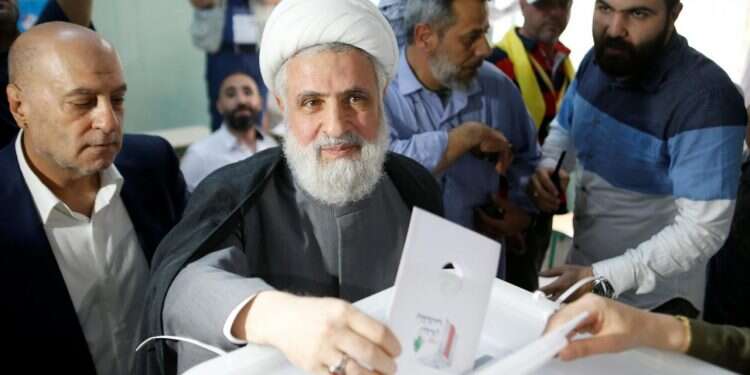Israeli officials reacted with concern as early results in Lebanon's first parliamentary elections in nine years indicated that the militant Iranian-backed Shiite group Hezbollah and its allies had won more than half the seats.
"Hezbollah equals Lebanon," tweeted Education Minister Naftali Bennett.
Bennett said Hezbollah's gains in Sunday's election show that Hezbollah is now indistinguishable from the state and the two should be viewed as one. He suggested that in any future war, Israel would not distinguish between actions by the Lebanese army, viewed until now as the country's legitimate military, and Hezbollah, which was viewed as a rogue terrorist organization.
"The State of Israel will not differentiate between the sovereign State of Lebanon and Hezbollah, and will view Lebanon as responsible for any action from within its territory," Bennett said.
If the initial election results are confirmed in the final count, this spells a significant political boost for heavily armed Hezbollah, with parties and individuals aligned with it securing a simple parliamentary majority.
Hezbollah, along with affiliated groups and individuals, has secured at least 67 seats in the 128-seat parliament, according to a Reuters calculation based on preliminary results for nearly all the seats, obtained from politicians and campaigns and reported in Lebanese media.
Hezbollah's powerful position in Lebanon reflects Iran's regional ascendancy in territory stretching through Iraq and Syria to Beirut. It is an avowed enemy of neighboring Israel and is classified as a terrorist group by the United States, Israel, and several other nations.
The early election results indicate that Western-backed Lebanese Prime Minister Saad Hariri will emerge as the Sunni Muslim leader with the biggest parliamentary bloc, making him the frontrunner to lead the next government even though he lost seats in his strongholds.
Lebanon's prime minister must be a Sunni, according to the country's sectarian power-sharing system. The new government, like the outgoing one, is expected to include all the main parties. Cabinet appointments are expected to take time.
International donors want to see Beirut embark on serious economic reforms to reduce state debt levels before they will release billions pledged at a Paris aid conference in April.
The election was held under a complex new law that redrew constituency boundaries and changed the electoral system from winner-takes-all to a proportional one.
The staunchly anti-Hezbollah Christian party Lebanese Forces also appears to have emerged as a winner in the election, nearly doubling the number of its seats from eight to 15, according to unofficial reports.
Hezbollah's allies include the Shiite Amal Movement led by Parliament Speaker Nabih Berri, the Christian Free Patriotic Movement founded by President Michel Aoun, and others that view Hezbollah's weapons as an asset to Lebanon.
Hezbollah-backed Sunnis did well in Beirut, Tripoli and Sidon, traditionally strongholds of Hariri's Future Movement, the preliminary results showed. On its front page, the pro-Hezbollah al-Akhbar newspaper called the upset a "slap" for Hariri.
According to the unofficial results, Hezbollah-backed winners include Jamil al-Sayyed, a retired Shiite general and former Lebanese intelligence chief who is a close friend of Syrian President Bashar Assad. Sayyed was one of the most powerful men in Lebanon in the 15 years of Syrian domination after the 1975-1990 civil war.
At least five other figures who held office during the Syria-dominated era returned to parliament for the first time since Syrian forces withdrew from Lebanon after the assassination of Rafik Hariri, Saad's father, in 2005.
Voter turnout was 49.2%, down from 54% in the last elections, nine years ago.
Media outlets affiliated with Hezbollah blamed the low turnout on "Zionist propaganda aimed at hurting Hezbollah's chances."
Independent candidates running against the political establishment won two seats in Beirut.
Hezbollah leader Hassan Nasrallah was due to give an address about the results on Monday.
Hezbollah did lose ground in one of its strongholds, the Baalbek-Hermel constituency, where two of its 10 seats there were won by its opponents, one from the Lebanese Forces and the other from Future.
Lebanon had been scheduled to hold a parliamentary election in 2013 but when leaders could not agree on a new election law, the parliamentarians instead voted to extend their term.
In the last elections, in 2009, an anti-Hezbollah alliance led by Hariri and backed by Saudi Arabia won a majority in the parliament.
But that group, dubbed the March 14 alliance, has disintegrated and Saudi Arabia has switched its attention and resources to confronting Iran in other parts of the region, notably Yemen.
Lebanese Forces leader Samir Geagea said the results show there is still a "popular ground" that backs March 14 and will "give us strength and a push to fix the path much more than we were able to in the past years."
Geagea is Hezbollah's most prominent Lebanese Christian opponent. He led the Lebanese Forces militia in the last years of the civil war, during which he was an adversary of Aoun.
The question of Hezbollah's significant weapons arsenal has slipped down the political agenda in Lebanon in recent years. Hezbollah has grown more powerful militarily since 2012, deploying its fighters to Syria and Iraq, where it has fought in support of Iranian allies.
Hariri, who led years of political conflict with the group, says this is an issue to be resolved at the regional level through dialogue.
Enhanced Hezbollah sway over Lebanon will likely alarm the United States, which arms and trains the Lebanese army.
But the group and its allies are not on course to win the two-thirds majority that would allow them to pass big decisions alone, such as changing the constitution.
Meanwhile, Iraq is scheduled to hold an election on May 12 that is also set to reflect Iran's growing reach, with one of three pro-Iran Shiite leaders set to become prime minister.




